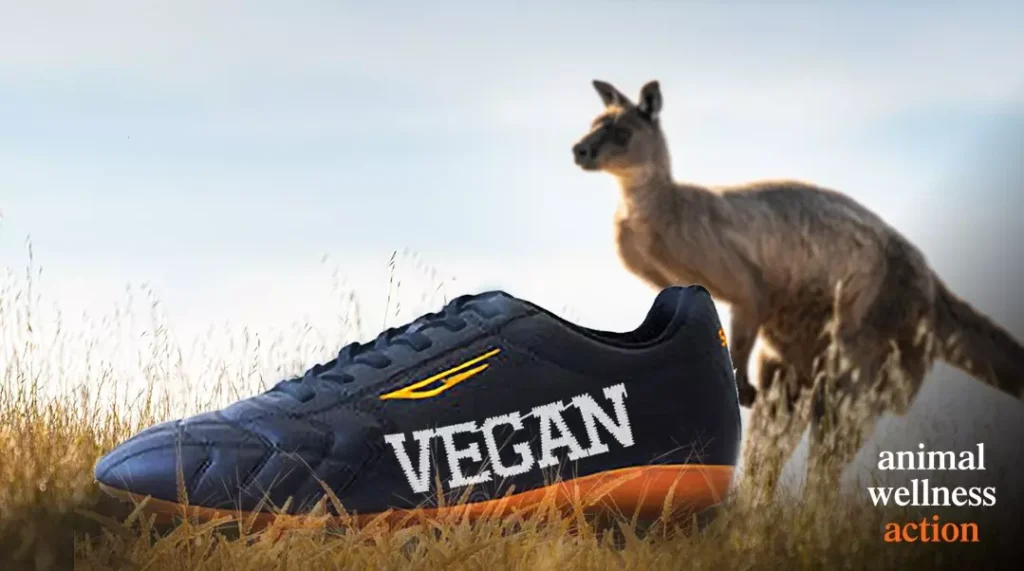Press Release


- For Immediate Release:
- Contact:
- Jennifer Skiff
- 917-900-6628
- Email Jennifer here
Sokito Drops Kangaroo Leather, Opting for Sustainable, Humanely Sourced Materials for its Athletic Shoes
U.K. company joins Nike, Puma, New Balance, Diadora in shedding skins of wildlife
Washington, D.C. — Citing concerns over “kangaroo population management practices, and population count discrepancies” in a commercial kill managed by the Australian government, soccer cleat maker Sokito announced today it will no longer use kangaroo leather in the production of its shoes.
“As a brand that represents a sustainable and ethical choice for footballers, our materials and supply chain practices must be of the highest standard,” said Jake Hardy, founder of Sokito. “The time is right to phase out kangaroo leather.”
The decision by Sokito is notable because the only animal-derived leather the company has used since its inception in 2018 has been kangaroo. “We have successfully developed a vegan certified football boot so we know that there are alternative materials on the market today that can perform just as well as animal leather,” Hardy said.

“Sokito has made the right moral and business decision in shedding kangaroo skins in its soccer boots,” said Wayne Pacelle, president of the Center for a Humane Economy and Animal Wellness Action. “We applaud Sokito for aligning its purchasing practices with 21st-century norms and values on animal welfare and wildlife protection.”
Sokito joins sportswear giants Nike, Puma, and New Balance that made pledges to end their sourcing of kangaroo skins for all shoes. Diadora, the Italy-based athletic shoe giant, dropped kangaroo-based shoes in 2021. These decisions were made after awareness was built by the Center for a Humane Economy and its Kangaroos Aren’t Shoes campaign.The Center has demanded that athletic shoe companies use alternative fabrics in shoes to halt the mass wounding and killing kangaroos in night-time commercial shoots and the orphaning of hundreds of thousands of joeys left behind to suffer and die.
It is estimated that commercial shooters kill more than 1 million adult kangaroos in their native habitats in Australia, along with perhaps 300,000 orphaned joeys. Those numbers are down by several hundred thousand since the Center launched its KANS campaign. There is now broad agitation throughout the world to halt sales of native wildlife. With the Germany-based company Adidas continuing to drive the slaughter of kangaroos, it is still the largest annual slaughter of terrestrial wildlife on the planet.
Louise Ward, director of Australia’s Animal Justice Party in the state of New South Wales, was instrumental in first making the case to Sokito that it should rethink its policy on sourcing kangaroos.
“Kudos to Sokito for its decision to cease using kangaroo skin in its soccer boots,” said Ward, whose organization has been hard at work fighting against her country’s mass killing of kangaroos. “Delving deep into Australia’s Kangaroo industry, (Sokito) uncovered the stark reality: declining populations, inadequate regulation, and cruelty. The commercial use of native wildlife has never been and will never be sustainable.”
Sokito’s announcement comes on the heels of one by ASN Bank in the Netherlands, to take Adidas off its list of recommended companies. Mariëtta Smid, Senior Manager of Sustainability at ASN Impact Investors told CHE, “We have indeed excluded Adidas from our investment universe because Adidas sources kangaroo leather and continues to do so.” Smid added, “We also always inform a company when we exclude it and share why we decided to exclude it. Adidas knows we did exclude it and why.”
More information on the Center for a Humane Economy’s Kangaroos Aren’t Shoes campaign can be found here.
Animal Wellness Action is a Washington, D.C.-based 501(c)(4) whose mission is to help animals by promoting laws and regulations at federal, state and local levels that forbid cruelty to all animals. The group also works to enforce existing anti-cruelty and wildlife protection laws. Animal Wellness Action believes helping animals helps us all. Twitter: @AWAction_News
Center for a Humane Economy is a Washington, D.C.-based 501(c)(3) whose mission is to help animals by helping forge a more humane economic order. The first organization of its kind in the animal protection movement, the Center encourages businesses to honor their social responsibilities in a culture where consumers, investors, and other key stakeholders abhor cruelty and the degradation of the environment and embrace innovation as a means of eliminating both. The Center believes helping animals helps us all. Twitter: @TheHumaneCenter